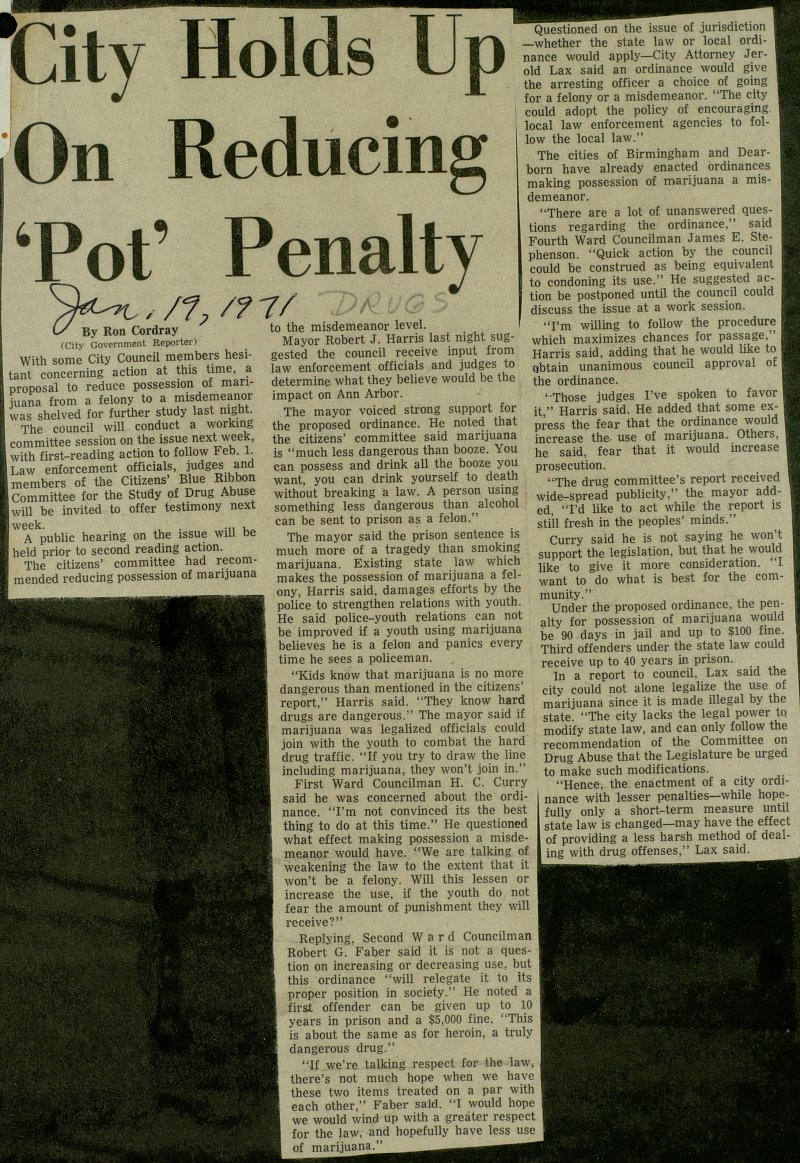City Holds Up On Reducing 'Pot' Penalty

With some City Council members hesitant concerning action at this time, a proposal to reduce possession of marijuana from a felony to a misdemeanor was shelved for further study last night. The council will conduct a working committee session on the issue next week, with first-reading action to follow Feb. 1. Law enforcement officials, judges and members of the Citizens' Blue Ribbon Committee for the Study of Drug Abuse will be invited to offer testimony next week. A public hearing on the issue will be held prior to second reading action. The citizens' committee had recommended reducing possession of marijuana to the misdemeanor level. Mayor Robert J. Harris last night suggested the council receive input from law enforcement officials and judges to determine what they believe would be the impact on Ann Arbor. The mayor voiced strong support for the proposed ordinance. He noted that the citizens' committee said marijuana is "much less dangerous than booze. You can possess and drink all the booze you want, you can drink yourself to death without breaking a law. A person using something less dangerous than alcohol can be sent to prison as a felon." The mayor said the prison sentence is much more of a tragedy than smoking marijuana. Existing state law which makes the possession of marijuana a felony, Harris said, damages efforts by the police to strengthen relations with youth. He said police-youth relations can not be improved if a youth using marijuana believes he is a felón and panics every time he sees a policeman. "Kids know that marijuana is no more dangerous than mentioned in the citizens' report," Harris said. "They know hard drugs are dangerous." The mayor said if marijuana was legalized officials could join with the youth to combat the hard drug traffic. "If you try to draw the line including marijuana, they won't join in." First Ward Councilman H. C. Curry said he was concerned about the ordinance. "I'm not convinced its the best thing to do at this time." He questioned what effect making possession a misdemeanor would have. "We are talking of weakening the law to the extent that it won't be a felony. Will this lessen or increase the use, if the youth do not fear the amount of punishment they will receive?" Replying, Second W a r d Councilman Robert G. Faber said it is not a question on increasing or decreasing use, but this ordinance "will relegate it to its proper position in society." He noted a first offender can be given up to 10 years in prison and a $5,000 fine. "This is about the same as for heroin, a truly dangerous drug." "If we're talking respect for the law, there's not much hope when we have these two items treated on a par with each other," Faber said. "I would hope we would wind up with a greater respect for the law, and hopefully have less use of marijuana." Questioned on the issue of jurisdiction I - whether the state law or local ordinance would apply- City Attorney Jerold Lax said an ordinance would give the arresting officer a choice of going for a felony or a misdemeanor. "The city could adopt the policy of encouraging. local law enforcement agencies to follow the local law." The cities of Birmingham and Dearborn have already enacted ordinances making possession of marijuana a misdemeanor. "There are a lot of unanswered questions regarding the ordinance," said Fourth Ward Councilman James E. Stephenson. "Quick action by the council could be construed as being equivalent to condoning its use." He suggested action be postponed until the council could discuss the issue at a work session. I'm willing to follow the procedure which maximizes chances for passage," Harris said, adding that he would like to obtain unanimous council approval of the ordinance. 'Those judges I've spoken to favor it " Harris said. He added that some express the fear that the ordinance would increase the use of marijuana. Others, he said, fear that it would increase prosecution. "The drug committee's report received wide-spread publicity," the mayor added, "I'd like to act while the report is still fresh in the peoples' minds." Curry said he is not saying he won't support the legislation, but that he would like to give it more consideration. "I want to do what is best for the community." Under the proposed ordinance, the penalty for possession of marijuana would be 90 days in jail and up to $100 fine. Third offenders under the state law could receive up to 40 years in prison. In a report to council, Lax said the city could not alone legalize the use of marijuana since it is made illegal by the state. "The city lacks the legal power to modify state law, and can only follow the recommendation of the Committee on Drug Abuse that the Legislature be urged to make such modifications. "Hence, the enactment of a city ordinance with lesser penalties- while hopefully only a short-term measure until state law is changed - may have the effect of providing a less harsh method of dealing with drug offenses," Lax said.
Article
Subjects
Ron Cordray
Research
Marijuana laws
Marijuana Ordinance
Marijuana
Laws & Legislation
Drugs
Drug Abuse
Citizens' Blue Ribbon Committee for the Study of Drug Abuse
Ann Arbor City Council
Ann Arbor - City Ordinances
Ann Arbor News
Old News
Robert J. Harris
Robert G. Faber
Jerold Lax
H. C. Curry